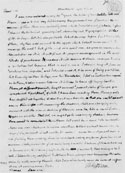 Thomas Jefferson received many requests that he purchase new books or sign subscription lists for proposed publications. He often agreed, and when he chose not to participate he usually simply ignored these solicitations. Exceptions, however, can be found. On 13 Apr. 1811 Jefferson's friend Thomas Law asked him to put his name down for a proposed translation of a French author's 1809 Atlas Historique, Généalogique, Chronologique et Géographique. Jefferson provided a witty refusal, counting the number of books he would rather read before getting to the one in question, predicting that he would die long before he had read even that number, and adding that he saw no point in acquiring a geographical reference work until Napoleon stopped redrawing the map of Europe.
Thomas Jefferson received many requests that he purchase new books or sign subscription lists for proposed publications. He often agreed, and when he chose not to participate he usually simply ignored these solicitations. Exceptions, however, can be found. On 13 Apr. 1811 Jefferson's friend Thomas Law asked him to put his name down for a proposed translation of a French author's 1809 Atlas Historique, Généalogique, Chronologique et Géographique. Jefferson provided a witty refusal, counting the number of books he would rather read before getting to the one in question, predicting that he would die long before he had read even that number, and adding that he saw no point in acquiring a geographical reference work until Napoleon stopped redrawing the map of Europe.
I am now entered on my 69th year. the tables of mortality tell me I have 7. years to live. my bibliomany has possessed me of perhaps 20,000. volumes. of these there are probably 1000. which I would read, of choice, before I should the historical, genealogical, chronological, & geographical Atlas of M. Le Sage. but it is also probable I shall decamp before I get through 50. of them. why then add an unit to the 19,950. which I shall never read? to encorage the work? but, if the work is a good one, as your recommendation satisfies me it is, it will find it’s proper encoragement in the multitude of purchasers & readers it will deserve & obtain. were you to write a 30. Dollar book to prove that 2. and 2. are 4. I should buy it from an ‘instinctive impulse,’ and I should read it, & be sure of being gratified. but knowing neither Le Sage, nor his translator, I feel no ‘instinctive impulse’ as to them, & sober reason tells me it is time to leave off buying books. I have, at different periods, bought several ‘present states of Europe, geographical & political,’ & while I have been reading them, Bonaparte has shuffled all together, & dealt out new hands. so that one might as well amuse himself with measuring the shadows, which are changing every moment with the rise or decline of the sun. were he, like a second Joshua, to give us another Stet Sol, we might go to measuring shadows, because there would be some stability in them: but until he is dead, & the re-revolutions are over which are to restore countries to their antient boundaries, the map of the moment is not worth it’s room. mine too is at present more a life of riding than reading. I am on horseback among my farms from breakfast to dinner. I take journies too of 100 miles every 3. months. I took one of them on horseback in January last. this is more likely to baffle the bill1 of mortality than reading a 30.D. book. I believe then, my good friend, I will leave to you younger men to encourage this enterprize by really reading the work, which I should certainly never do. cura ut valeas, et me, ut amaris, ama. Vale.
PoC (DLC); at foot of text: “Thomas Law esq”; endorsed by TJ.
Law had sent his pamphlet on instinctive impulse in an undated letter TJ received on 14 Nov. 1810. TJ’s biblical reference is to joshua 10.12–4, in which God made the sun stand still (stet sol) so that the Israelites could complete their victory over the Amorites. cura ut valeas, et me, ut amaris, ama. vale: “take care that you fare well, and love me as you are loved. Good-bye”.
1Word canceled, evidently by mistake.
COPYRIGHT NOTICE: Published by Princeton University Press and copyrighted, ©, by Princeton University Press. All rights reserved. No part of this book may be reproduced in any form by any electronic or mechanical means (including photocopying, recording, or information storage and retrieval) without permission in writing from the publisher, except for reading and browsing via the World Wide Web. Users are not permitted to mount this file on any network server.
